When Paul Lindsay visits his father Richard, who was diagnosed with Alzheimer’s disease in 2020, he is greeted with only the faintest glimmer of recognition.
Richard no longer knows his friends or family, except for Paul and his mother.

Laser-based test could transform early diagnosis.
When Paul Lindsay visits his father Richard, who was diagnosed with Alzheimer’s disease in 2020, he is greeted with only the faintest glimmer of recognition.
Richard no longer knows his friends or family, except for Paul and his mother.
The man is gone. He just sits in a chair and looks up at the television.
And this is someone who was well known at his local gym, who ate and drank sensibly, who as a social worker supported families affected by the Hillsborough disaster.
He ran the London Marathon in three hours and 16 minutes in his 60s. Now, I see my dad as a silhouette who’s walked off into the distance.
Paul Lindsay
For families like Paul’s, an early diagnosis of dementia can be the difference between holding on to loved ones for up to a decade, or losing first their personality and then their lives in just a few short years.
Yet for too many people, diagnosis comes late, sometimes after two years of waiting, when irreversible brain changes have already taken hold.
Dementia currently affects nearly one million people in the UK, a number expected to rise to 1.6 million by 2040.
The cost of late diagnosis is high: faster decline, fewer treatment options and a greater reliance on long-term care.
“By the time the symptoms of dementia and other neurological diseases appear, it is already too late [for meaningful intervention],” Professor Sumeet Mahajan of the University of Southampton told the BBC.
Professor Mahajan and colleagues at University Hospital Southampton have developed a new laser-based test that could transform how dementia is detected and treated.
The five-minute diagnostic, supported by Swindon-based UK Research and Innovation (UKRI), has shown 93% accuracy in a preliminary study involving 150 patients.
Known as multi-excitation Raman spectroscopy, the test uses laser light to analyse a single drop of blood or spinal fluid, detecting biochemical changes years before symptoms appear.

The project, called Holistic Optical Biomarkers to Transform Dementia Diagnosis (HOpE), is part of a £32.4 million investment in interdisciplinary research, which brings together different disciplines to solve research and societal challenges.
The aim is to develop a compact device that could be used in GP surgeries or local clinics, providing affordable, accessible screening for those most at risk.
Paul sees what a difference that would make: “The diagnosis time is massive. If we can sort that out, this technology could be a game-changer for families like ours.”
For neurologists, the promise of earlier detection goes far beyond the clinic.
If you can delay somebody’s progression of dementia, you can prevent them having to be in a nursing home and you can reduce the amount of extra care that they need.
If we can delay that by five years, we can make a huge impact from an economic point of view and also at an individual and personal point of view.
Professor Christopher Kipps
Consultant Neurologist, University Hospital Southampton
With dementia cases rising and pressure on health services increasing, the ability to identify the disease earlier, and act on it, could transform not only treatment but lives.
Behind these advances lies the work of UKRI staff, whose funding decisions make early-stage, high-risk projects like HOpE possible.
By supporting ambitious collaborations between universities and hospitals, UKRI helps researchers turn promising ideas into technologies with the potential to change practice worldwide.
For Paul, this means hope that other families may keep hold of their loved ones for longer.
For clinicians, it means new tools to slow the devastating effects of the disease. For society, it means a chance to reduce the growing economic and social costs of dementia.
Thanks to UKRI-backed research, the future may hold not just longer lives, but better ones.
With thanks to Alzheimer’s Society for connecting us with Paul Lindsay. Paul is raising money for the Alzheimer’s Society through his Hiking Ginger fundraising campaign.
UKRI invests taxpayers’ money into groundbreaking research and innovation to improve the lives and livelihoods of people everywhere.
Headquartered in Swindon, UKRI creates impact locally and around the world, in areas from cancer treatments to clean oceans.